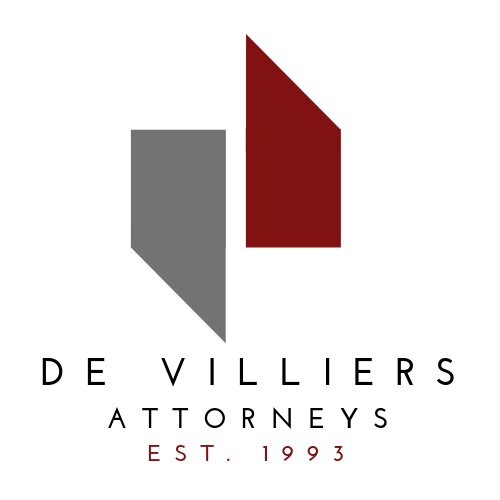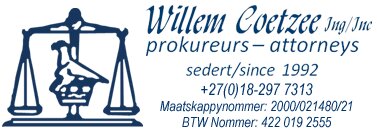Best Due Diligence Lawyers in Potchefstroom
Share your needs with us, get contacted by law firms.
Free. Takes 2 min.
List of the best lawyers in Potchefstroom, South Africa
About Due Diligence Law in Potchefstroom, South Africa
Due Diligence in Potchefstroom, as in the rest of South Africa, is a crucial process that businesses and individuals undertake to assess the legal, financial, and operational aspects of an entity. It is a rigorous evaluation that ensures that any assumptions made about a business transaction are grounded in fact. In Potchefstroom, which is a dynamic part of the North West Province, this process helps in making informed decisions, especially in real estate, mergers and acquisitions, and large investments.
Why You May Need a Lawyer
Situations that necessitate legal advice for Due Diligence often involve complex transactions where significant financial stakes are involved. You may need a lawyer for:
- Buying or selling a business where understanding liabilities and compliance obligations is crucial.
- Merging with or acquiring another company, which requires a thorough check of all legal standing, liabilities, and risk analysis.
- Investing in real estate or property development in which zoning laws, environmental regulations, and title deeds must be reviewed.
- Entering into significant contracts that require assurance of the other party’s financial health and legal compliance.
Local Laws Overview
In Potchefstroom, Due Diligence is governed by several laws and regulations that are part of South Africa’s broader legal framework. Key aspects include:
- The Companies Act, which provides guidelines for corporate governance and responsibilities in business transactions.
- The Financial Intelligence Centre Act (FICA), which mandates the verification of identity and financial backgrounds, especially to prevent money laundering.
- The National Credit Act, when examining credit agreements to ensure compliance and the protection of consumer rights.
- Employment laws that involve the assessment of labor relations and compliance with minimum wage and safety standards.
Frequently Asked Questions
What is the purpose of Due Diligence?
Due Diligence aims to minimize risk by ensuring that a business decision is based on accurate and complete information, thus protecting against unforeseen liabilities.
What are the main types of Due Diligence?
The main types include financial, legal, operational, strategic, and human resources Due Diligence, each focusing on different aspects of the business.
How long does the Due Diligence process take?
The duration varies depending on the transaction's complexity. It can take anywhere from a few weeks to several months.
Is Due Diligence mandatory in all transactions?
While not legally mandatory, it is highly recommended to perform Due Diligence to uncover any hidden liabilities or issues which could impact the transaction negatively.
Can I perform Due Diligence myself?
You can, but it is advisable to engage professionals-lawyers, accountants, or consultants-who have experience in comprehensive evaluations and can identify potential issues you might overlook.
What documents are typically required for Due Diligence?
Essential documents include financial statements, legal contracts, employment records, intellectual property records, and any other relevant documentation specific to the transaction at hand.
What risks does Due Diligence mitigate?
It helps mitigate financial risks, legal liabilities, reputational damage, and operational disruptions by providing a comprehensive analysis before a transaction.
What happens if Due Diligence uncovers potential issues?
Findings might lead to renegotiations, amendments in the terms, or even a decision to back out if the risks outweigh the benefits.
Who can conduct Due Diligence?
Due Diligence can be conducted by internal teams, but often external advisors such as lawyers and accountants are engaged to ensure an unbiased and thorough review.
How can I ensure the Due Diligence process is thorough?
Engage expert professionals, define clear objectives, and ensure you have access to all necessary information and that all findings are documented and reviewed.
Additional Resources
For those seeking further assistance, the following resources may be helpful:
- South African Companies and Intellectual Property Commission (CIPC) for company information and compliance requirements.
- Local law firms specializing in corporate law for advice and assistance.
- Financial advisors with expertise in the current economic landscape of Potchefstroom.
- The North West Provincial Government’s Department of Economy and Enterprise Development.
Next Steps
If you require legal assistance in Due Diligence, begin by identifying specific needs related to your transaction. Seek recommendations for reputable legal experts or consult directly with law firms in Potchefstroom. Initiate consultations to explore the level of services they offer, associated costs, and their approach to handling due diligence processes. Ensure they have a deep understanding of local laws and relevant experience in your specific industry or transaction type.
Lawzana helps you find the best lawyers and law firms in Potchefstroom through a curated and pre-screened list of qualified legal professionals. Our platform offers rankings and detailed profiles of attorneys and law firms, allowing you to compare based on practice areas, including Due Diligence, experience, and client feedback.
Each profile includes a description of the firm's areas of practice, client reviews, team members and partners, year of establishment, spoken languages, office locations, contact information, social media presence, and any published articles or resources. Most firms on our platform speak English and are experienced in both local and international legal matters.
Get a quote from top-rated law firms in Potchefstroom, South Africa — quickly, securely, and without unnecessary hassle.
Disclaimer:
The information provided on this page is for general informational purposes only and does not constitute legal advice. While we strive to ensure the accuracy and relevance of the content, legal information may change over time, and interpretations of the law can vary. You should always consult with a qualified legal professional for advice specific to your situation.
We disclaim all liability for actions taken or not taken based on the content of this page. If you believe any information is incorrect or outdated, please contact us, and we will review and update it where appropriate.









